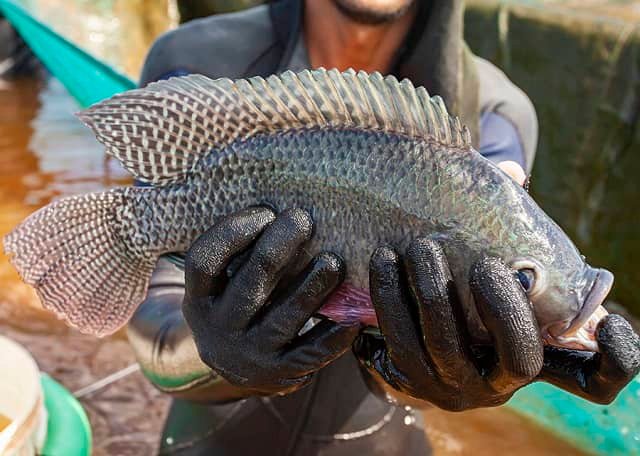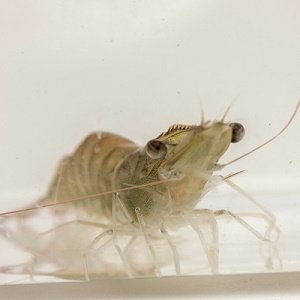
Have you ever heard of Alpha-Lipoic Acid (ALA)? It’s not just a buzzword but a potential lifesaver for fish facing the harsh realities of cold-water stress. A recent study by scientists from Zagazig University, University of Sadat City, Badr University in Cairo (BUC), and King Salman International University explored the potential of Alpha-Lipoic Acid (ALA) to protect Nile tilapia (Oreochromis niloticus) when temperatures drop, and the results are astonishing.
The Importance of Water Temperature for Tilapia
Water temperature isn’t just a matter of comfort for fish; it throws their entire world out of balance. Activity, growth, even internal functions, everything goes haywire.
Nile tilapia can withstand water temperatures up to 8°C for short periods. However, when the water temperature drops below 18°C, things start going awry for fish farmers. Vulnerability to cold is a significant economic concern, leading to shorter growth seasons and winter mortalities, causing substantial losses. Cold Water Stress (CWS) is a major contributor to fish diseases and deaths, impacting the productivity of tropical aquaculture systems worldwide.
Cold water stress triggers various events affecting tilapia health, including increased cortisol levels, weakened immune systems, lethargy, reduced digestion, nutrient absorption, and impairment of antioxidant enzymes.
Alpha-Lipoic Acid (ALA)
Alpha-Lipoic Acid (ALA) is a potent antioxidant that absorbs harmful free radicals before they can wreak havoc on fish cells. By activating fat and carbohydrate pathways, more energy becomes available, reducing the need to break down valuable proteins as fuel. This allows fish facing CWS to conserve proteins for muscle development and tissue repair, making them stronger and more resilient.
Several studies have reported the benefits of ALA in herbivorous carp, vannamei shrimp, and Nile tilapia.
The Experiment
Researchers gathered 240 Nile tilapia and divided them into four groups. Some fish faced low water temperatures at 18°C, while others were raised at a water temperature of 25°C. Half of each temperature group received the standard diet, while the other half received a healthy dose of feed enriched with alpha-lipoic acid (600 mg ALA/kg of diet).
The Results
Fish fed with ALA, even those facing low water temperatures, thrived. They consumed their food better, grew stronger, and showed far fewer signs of stress-induced anemia and cholesterol spikes.
“The study findings demonstrated an elevated stress response after the fish’s exposure to CWS (18 °C) for 60 days in hematobiochemical, immunological, behavioral, and molecular markers,” report the scientists.
Stay Always Informed
Join our communities to instantly receive the most important news, reports, and analysis from the aquaculture industry.
According to the study results, dietary supplementation with ALA reduced cold stress in fish kept at 18°C and increased survival rates.
But ALA’s magic went beyond basic health. The study reports the following results:
- Increased Antioxidant Capacity: ALA boosted fish’s natural defenses, accelerating their antioxidant machinery and providing a shield against harmful free radicals.
- Improved Digestion: Cold water tends to slow digestion; however, fish fed with ALA experienced an increase in intestinal enzyme activity, breaking down their food easily and ensuring they absorbed precious nutrients.
- Inflammation and Cell Death: During cold stress, inflammation increases. The study showed that ALA negatively regulated genes related to inflammation and cell death.
- Reduced Organ Damage: ALA minimized cold-induced damage in the liver, spleen, and intestines, keeping everything running smoothly.
Conclusion
So, what does this mean for tilapia fish farmers? ALA, at a dose of 600 mg/kg of diet, emerges as a potent “superhero” in tilapia feeding to cope with stress when water temperatures drop. It stimulates growth, strengthens immunity, reduces inflammation, and protects organs, offering much-needed support to fish farmers during cold spells.
This study is just the first step in understanding the wonders of ALA. Future research can explore its long-term effects, optimal doses for different fish species, and potential benefits in other aquaculture challenges.
But for now, one thing is clear: ALA is worth its weight in gold when it comes to keeping our tilapia healthy, even when the water turns cold. It’s also essential to highlight that resveratrol and propolis have shown positive results when used as supplements to protect tilapia from low temperatures.
The study received financial support from The Science, Technology & Innovation Funding Authority (STDF) in cooperation with The Egyptian Knowledge Bank (EKB).
Contact
Adham A. Al-Sagheer
Department of Animal Production, Faculty of Agriculture
Zagazig University
Zagazig, 44511, Egypt
Email: adham_alsaht@zu.edu.eg
Reference (open access)
Behairy, A., Ghetas, H.A., Abd-Allah, N.A. et al. Dietary alpha-lipoic acid boosts growth, immune-antioxidant traits, behavior, and transcriptomes of antioxidant, apoptosis, and immune-related genes to combat cold stress in Nile tilapia (Oreochromis niloticus). Aquacult Int (2023). https://doi.org/10.1007/s10499-023-01365-4
Editor at the digital magazine AquaHoy. He holds a degree in Aquaculture Biology from the National University of Santa (UNS) and a Master’s degree in Science and Innovation Management from the Polytechnic University of Valencia, with postgraduate diplomas in Business Innovation and Innovation Management. He possesses extensive experience in the aquaculture and fisheries sector, having led the Fisheries Innovation Unit of the National Program for Innovation in Fisheries and Aquaculture (PNIPA). He has served as a senior consultant in technology watch, an innovation project formulator and advisor, and a lecturer at UNS. He is a member of the Peruvian College of Biologists and was recognized by the World Aquaculture Society (WAS) in 2016 for his contribution to aquaculture.







